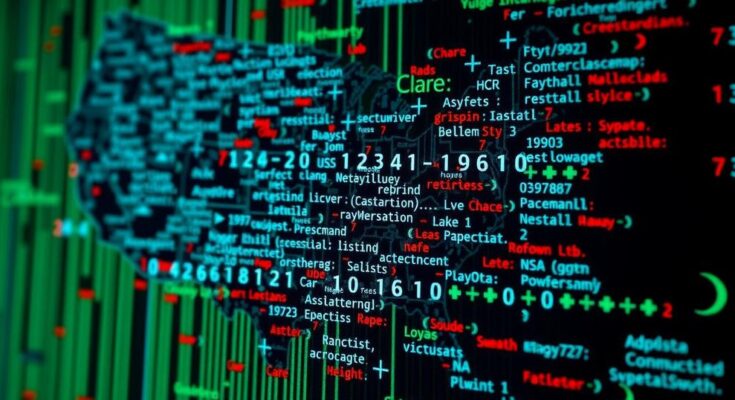Iranian government-linked hackers have been investigating election-related websites in key U.S. swing states in an apparent attempt to find vulnerabilities that could affect the upcoming presidential election, according to Microsoft. This probing activity, which occurred in April, has drawn attention from federal agencies and raised concerns about foreign interference, particularly from Iranian, Russian, and Chinese groups. Although there are no indications that hacking attempts to compromise election integrity have taken place, the situation highlights ongoing threats to public confidence in the electoral process.
Recent reports indicate that Iranian government-affiliated hackers have conducted reconnaissance on numerous election-related websites across key U.S. swing states, aiming to identify potential vulnerabilities that could influence the upcoming presidential election, according to Microsoft. This probing took place in April and was revealed to the public in a report released by Microsoft analysts on Wednesday. Additionally, these hackers were involved in gathering intelligence on major U.S. media outlets in May. Federal officials are closely monitoring this activity, as U.S. intelligence agencies have expressed concerns that Iran is attempting to incite division during the 2024 election cycle. Such interference includes targeted hacking against former President Donald Trump’s campaign, as well as efforts to inspire protests related to U.S. policies regarding Israel. Microsoft anticipates an increase in the hacking group’s activities as the election approaches, noting their history of election-related interference. The report comes in light of ongoing concerns that various Iranian, Russian, and Chinese groups are either intending to sway or monitor the U.S. election as the presidential campaign nears its conclusion. Importantly, while the Iranian hackers’ probing and research may have identified vulnerabilities, there is currently no evidence that these efforts have escalated to actual hacking attempts. This activity does not pose a direct risk to the integrity of U.S. voting systems, which are safeguarded by numerous checks and balances. Nevertheless, U.S. officials worry that these actions could be part of a foreign-backed effort to undermine public confidence in the electoral process. For instance, hackers might leak publicly available voter registration data to create the illusion of access to sensitive election systems. In the context of recent intelligence assessments, U.S. officials highlighted that Russian operatives have been spreading disinformation on platforms like X to target Democratic candidates. Microsoft also noted that one Russian group began using X to propagate modified videos disparaging Vice President Kamala Harris, further exacerbating concerns about disinformation campaigns in the lead-up to the election. The Iranian hacking collective, identified as Cotton Sandstorm and linked to the Islamic Revolutionary Guard Corps, has a troubling history of utilizing tactics aimed at intimidating voters, as evidenced by their actions in the 2020 election. In that election cycle, they also accessed voter registration data in efforts to disrupt the electoral process. While China is not perceived as having mounted a significant campaign to influence the presidential election, it has engaged in covert social media initiatives targeting various local and congressional races.
The article discusses the alarming trend of foreign interference in the United States elections, particularly focusing on the activities of Iranian hackers in relation to the 2024 presidential election. These hackers have been seen probing election websites in key states to identify vulnerabilities for potential exploitation. The report raises significant concerns among U.S. officials regarding the integrity of the electoral process and emphasizes the broader implications of such cyber activities amidst heightened geopolitical tensions. The mention of other foreign entities, such as Russian and Chinese groups, engaging in similar activities illustrates a growing pattern of digital threats aimed at manipulating the democratic process. Furthermore, the report reflects deeper issues regarding public confidence in elections and the operational capabilities of foreign state actors in leveraging disinformation and hacking methods. Understanding this context highlights the necessity for vigilance and cybersecurity measures to safeguard democratic institutions against foreign interference.
In conclusion, the recent activities of Iranian hackers probing U.S. election-related websites unveil a concerning landscape of foreign interference concerning the upcoming presidential election. While current evidence suggests that these actions have not progressed into direct hacks that could jeopardize voting integrity, the intent to sow discord and mistrust within the electorate remains evident. As election season intensifies, officials are alarmed by the potential for manipulative tactics supported by foreign states, emphasizing the critical need for heightened awareness and robust cybersecurity measures to protect democratic processes. The involvement of multiple international actors in this space necessitates profound scrutiny to safeguard electoral integrity and public confidence in the electoral system.
Original Source: www.cnn.com




